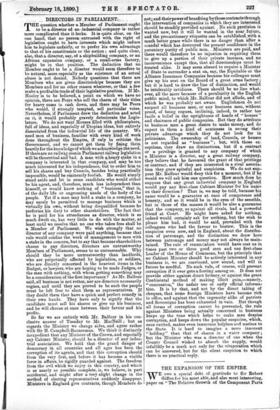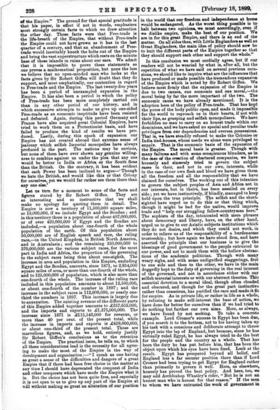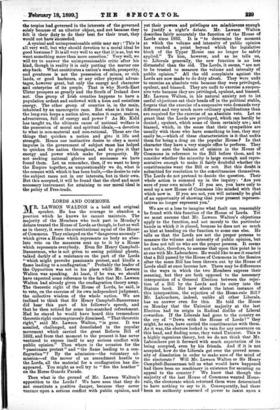THE EXPANSION OF THE EMPIRE.
WE owe a special debt of gratitude to Sir Robert Giffen for his most able, and also most interesting, paper on " The Relative Growth of the Component Parts of the Empire." The ground for that special gratitude is that his paper, in effect if not in words, emphasises most strongly certain facts to which we drew attention the other day. Those facts were that Free-trade is the life-breath of the Empire, that without Free-trade the Empire could not have grown as it has in the last quarter of a century, and that an abandonment of Free- trade would inevitably knock the bolts out of the Empire and bring the vast superstructure which rests on the minute base of these islands in ruins about our ears. We admit that it is impossible to prove these statements as one proves a mathematical proposition, but none the less we believe that no open-minded man who looks at the facts given by Sir Robert Giffen will doubt that they do support, and most emphatically, our contention in regard to Free-trade and the Empire. The last twenty-five years has been a period of unexampled expansion in the Empire. It has also been a period in which the policy of Free-trade has been more completely carried out than in any other period of our history, and in which successive attempts to make us give up one-sided Free-trade as an economic ineptitude have been resisted and defeated. Again, during this period Germany and France have also acquired great Colonial Empires, have tried to work them on a Protectionist basis, and have failed to produce the kind of results we have pro- duced. Lastly, during this epoch of expansion our Empire has not created abroad that extreme sense of jealousy which selfish Imperial monopolies have always produced in the past. The nations may be envious, but none of them have ever shown any genuine willing- ness to combine against us under the plea that any one would be better in India or Africa or the South Seas than the British. On the contrary, it has been evident that each Power has been inclined to argue—' Though we hate the British, and would like this or that Colony for ourselves, yet we would far rather see them there than any one else.'
Let us turn for a moment to some of the facts and figures stated by Sir Robert Giffen. They are so interesting and so instructive that we shall make no apology for quoting them in detail. The Empire is now a territory of 11,500,000 square miles, or 13,000,000, if we include Egypt and the Soudan ; and in this territory there is a population of about 407,000,000, or of over 420,000,000 if Egypt and the Soudan are included,—a population about one-fourth of the whole population of the earth. Of this population about 50,000,000 are of English speech and race, the ruling race,—in the United Kingdom, in British North America, and in Australasia ; and the remaining 350,000,000 to 370,000,000 are the various subject races, for the most part in India and Africa, the proportion of the governing to the subject races being thus about one-eighth. The increase in area and population in this Empire, excluding Egypt and the Soudan, amounts, since 1871, to 2,854,000 square miles of area, or more than one-fourth of the whole, and to 125,000,000 of population, which is also more than one-fourth of the whole. The increase of the ruling race included in this population amounts to about 12,500,000, or about one-fourth of the number in 1897; and the increase in the subject races is 112,000,000, or nearly one- third the numbers in 1897. This increase is largely due to annexation. The existing revenue of the different parts of this Empire added together amounts to £257,653,000, and the imports and exports to £1.375,000,000. The increase since 1871 is £115,143,000 for revenue, or more than 40 per cent. of the present total, while the increase in imports and exports is £428,000,000, or about one-third of the present total. Those are marvellous figures, and, as we hold, entirely justify Sir Robert Giffen's conclusions as to the retention of the Empire. The practical issue, he tells us, to which all these considerations lead is the necessity for all agree- ing to make the most of the Empire in the way of development and organisation :—" I speak as one having so great a sense of the difficulties and dangers of a great Empire that if there had been free choice in the matter at any time I should have deprecated the conquest of India and other conquests which have made the Empire what it is. But the choice has not been quite free, and especially it is not open to us to give up any part of the Empire at will without making so great an alteration of our position in the world that our freedom and independence at home would be endangered. As the worst thing possible is to halt between two opinions, we must accordingly, even if we dislike empire, make the best of our position. We are in for this great Empire, and there is an end of the matter. On all sides then, with Little Englanders as well as Great Englanders, the main ides, of policy should now be to knit the different parts of the Empire together so that they should support each other and support the whole."
In this conclusion we most cordially agree, but if our readers will not be wearied by what is, after all, but the repetition of what we have said on several previous occa- sions, we should like to inquire what are the influences that have produced or made possible the tremendous expansion of the Empire which is noted by Sir Robert Giffen. We believe most firmly that the expansion of the Empire is due to two causes, one economic and one moral,—the moral being by far the more important of the two. The economic cause we have already mentioned. It is the adoption here of the policy of Free-trade. That has kept the pores of the body politic open, and made it impossible for the world to reproach us in their hearts, if not with their lips, as grasping and selfish monopolisers. We have, forbidden no man to carry on an honest trade within our dominions, and we have asked no special and peculiar trade privileges from our dependencies and oversea possessions. That is, we have steadily refused to make the Colonies or India tied-houses, whose needs we alone were privileged to supply. That is the economic basis of the expansion of the Empire. The moral basis is greater. Though with many failures and with some conspicuous blunders, as in the case of the creation of chartered companies, we have honestly and sincerely tried to govern the subject races in their, and not in our own, interests, while in the case of our own flesh and blood we have given them all the freedom and all the responsibility that we have claimed for ourselves. The working out of this intention to govern the subject peoples of Asia and Africa not in our interests, but in theirs, has been assailed on every side ; yet we have instinctively, if blindly, managed to keep bold upon the true principle. The selfish and the short- sighted have urged us to do this or that thing which, though it might be bad for the native, would improve trade and " help our struggling fellow-countrymen here." The sophists of the day, intoxicated with mere phrases about democracy and liberty, have, on the other hand, urged us to give to our Asiatic subjects institutions which they do not desire, and which they could not work, in order to relieve us of the responsibility of a burdensome trusteeship ; but here again we have stood firm, and have asserted the principle that our business is to give the blessings of good government to the people entrusted to our power, and not to mock them with the hollow abstrac- tions of the academic politician. Though with many weary sighs, and with some undignified staggerings, first to one side and then to the other, we have in the main doggedly kept to the duty of governing in the real interest of the governed, and not in accordance either with our selfish material interests or with our abstract theories. This essential devotion to a moral ideal, though often clouded and obscured, and though for the great part instinctive rather than conscious, has purified the race and made it fit for empire. As in private life; or rather in life as a whole, by refusing to make self-interest the base of action, we have done far better for ourselves than if we had tried to do nothing but further our own aims. Here, as always, we have found by not seeking. To take a concrete example. Lord Cromer's success in Egypt has been due, if you search it to the bottom, not to his having taken up his task with a conscious and deliberate attempt to throw Egypt into the lap of England, but because, since he has virtually ruled Egypt, he has always tried to do the best for the people and the country as a whole. That has been the duty he has put before him, that has been the object upon which his eves have been fixed. Look at the result. Egypt has prospered beyond all belief, and England has a far securer position there than if Lord Cromer had been trying to get Egypt for England rather than primarily to govern it well. Here, as elsewhere, honesty has proved the best policy. And here, too, we may add Archbishop Whatley's rider, "But he is not an honest man who is honest for that reason." If the men to whom we have entrusted the work of government in the tropics had governed in the interests of the governed solely because of an ulterior object, and not because they felt it their duty to do their best for their trust, they would not have succeeded.
A cynical and unimpressionable critic may say : This is all very well, but why should devotion to a moral ideal be good business ? It is all very well to say that it is so, but we want something more than mere assertion.' Very well, we will try to answer the unimpressionable critic after his kind, though in reality it is only putting the matter one step back: What constitutes a nation's wealth, prosperity, and greatness is not the possession of mines, or rich lands, or good harbours, or any other physical advan- tages, however great, but only the energy and character and enterprise of its people. That is why North-East Ulster prospers so greatly and the South of Ireland does not One group of Irish counties happens to have a population ardent and endowed with a, keen and resistless energy. The other group of counties is, in the main, inhabited by an unenergetic race. But what is it that in the long-run keeps a nation alive, makes it eager, zealous, adventurous, full of energy and power ? As Mr. Kidd has taught us, the ultimate cause of national welfare is the possession of moral and spiritual ideals,—a devotion to what is non-material and non-rational. These are the things that quicken a nation and give it life and strength. Hence our instinctive desire to obey a moral impulse in the government of subject races has helped to quicken the nation throughout, and to give .it that energy and power which make for prosperity. By not •seeking national glories and successes . we have found them. Let us remember, then, if we want to keep the Empire together, as unquestionably we do, what is the cement with which it has been built,—the desire to rule the subject races not in our interests, but in their own. But this accepted, it will be found that the chief and most necessary instrument for attaining to our moral ideal is the policy of Free-trade.








































 Previous page
Previous page